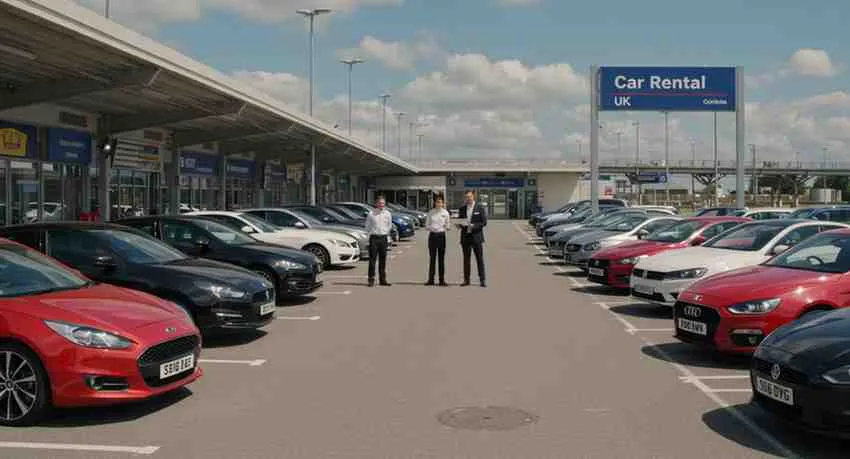Starting a car rental business can be exciting. It is challenging but rewarding. Many entrepreneurs are drawn to this market because it offers steady demand and growth opportunities. In this article, you will learn the essential steps and tips for launching a car rental company in the United Kingdom. Read on to find out what you need to succeed!
Market Research and Business Planning
Every successful business begins with research. Know your market. Understand your customers.
Understand the Demand
-
Tourists and Leisure Travelers: The UK attracts millions of visitors every year. Many prefer the convenience of renting a car over public transport.
-
Business Clients: Professionals and companies require reliable transportation.
-
Local Residents: People need cars for short-term use when their own vehicles are unavailable.
I once helped a friend analyze market trends in London. We discovered that areas near airports and major tourist spots had a higher rental rate. Simple. Effective.
Develop a Business Plan
Your business plan is your roadmap. It outlines goals, strategies, and budgets. A clear plan guides your decisions and helps secure funding.
Key elements include:
-
Executive Summary: Brief and clear.
-
Market Analysis: Know your competitors and demand.
-
Fleet Strategy: What types and how many vehicles?
-
Marketing Plan: How will you attract customers?
-
Financial Projections: Estimate revenues and costs.
Legal Requirements and Compliance
Before you begin, understand the legal side. This step is non-negotiable.
Choose Your Business Structure
Select the structure that suits your needs:
-
Sole Trader: Simple but personal liability.
-
Limited Company: Offers protection and credibility.
-
Partnership: Share responsibilities and risks.
Obtain Permits and Licenses

You must register your business with Companies House. Ensure each vehicle is registered with the DVLA. Also, obtain:
-
A business license from your local council.
-
Insurance for your fleet, public liability, and employer’s liability if you hire staff.
Remember to comply with consumer protection laws by offering clear rental terms.
Funding and Start-Up Costs
Money matters. Be prepared for a significant investment. Here’s a table summarizing typical start-up costs:
| Expense Category | Estimated Cost (£) | Details |
|---|---|---|
| Fleet Acquisition | 20,000 – 80,000 per 5–10 vehicles | Purchase or lease options; new vs. used vehicles |
| Premises and Setup | 5,000 – 15,000 annually | Rent, security, office setup |
| Insurance | 5,000 – 10,000 annually | Motor, public liability, and employer’s insurance |
| Technology | 2,000 – 6,000 | Booking system, fleet management software |
| Marketing and Advertising | 2,000 – 5,000 annually | Website, SEO, digital ads |
| Legal and Licensing Fees | 500 – 1,000 | Business registration and permits |
Total start-up costs can range between £30,000 and £100,000 depending on scale and vehicle choices.
Secure Financing
Options include:
-
Personal savings.
-
Business loans.
-
Crowdfunding.
-
Partnerships or investors.
A detailed financial plan boosts your credibility with lenders and investors.
Acquiring and Managing Your Fleet
Your fleet is the heart of your business. Choose wisely.
Vehicle Selection Tips
-
Variety: Offer economy cars, family SUVs, and even luxury models if the market demands.
-
Fuel Efficiency: Lower running costs attract eco-conscious renters.
-
Reliability: Choose vehicles with a strong maintenance record.
-
Eco-Friendly Options: Consider hybrids or electric vehicles to meet rising demand for green transportation.
Fleet Management Strategies
Implement a maintenance schedule:
-
Regular Servicing: Follow manufacturer guidelines.
-
Cleaning: Keep vehicles spotless to enhance customer satisfaction.
-
Record Keeping: Track service dates, repairs, and mileage.
-
Partner with a Trusted Garage: Ensure prompt and professional repairs.
Below is a table summarizing fleet management essentials:
| Aspect | Key Action | Benefit |
|---|---|---|
| Vehicle Selection | Choose reliable, fuel-efficient models | Lower costs, high customer satisfaction |
| Maintenance | Schedule regular servicing and cleaning | Minimized breakdowns and downtime |
| Record Keeping | Maintain detailed service logs | Informed decisions on vehicle upgrades |
| Partnerships | Collaborate with trusted garages | Faster repairs and expert maintenance |
Technology and Operational Systems
Technology makes your work easier. It saves time and reduces errors.
Online Booking System
A robust online booking system is essential:
-
User-Friendly: Make it easy for customers to reserve vehicles.
-
Secure Payments: Ensure safe transactions.
-
Real-Time Availability: Keep track of your fleet status.
Fleet Management Software
This software helps track:
-
Vehicle Location: Monitor fleet movements.
-
Maintenance Alerts: Receive notifications for scheduled services.
-
Fuel and Mileage Data: Optimize operations and cut costs.
I once integrated such a system for a local rental service. The result was a significant boost in operational efficiency. Simple. Smart.

Marketing and Customer Acquisition
Marketing is crucial. Get your name out there.
Digital Marketing Essentials
-
Website: Design a professional, mobile-optimized site.
-
SEO: Optimize with relevant keywords to attract local searches.
-
Social Media: Use Facebook, Instagram, and Twitter to engage with customers.
-
Online Reviews: Encourage happy customers to leave positive feedback.
Traditional Marketing Methods
-
Local Partnerships: Work with hotels, travel agencies, and local businesses.
-
Print Materials: Distribute flyers and brochures in high-traffic areas.
-
Vehicle Branding: Use your fleet as moving billboards by adding your logo and contact details.
Special Promotions
-
Discounts: Offer lower rates for long-term rentals.
-
Loyalty Programs: Reward repeat customers with special deals.
-
Referral Bonuses: Encourage customers to refer friends and family.
A strong digital presence is key in today’s market. Your website should be optimized for search engines with concise and informative content. Tracking your results helps adjust strategies to meet customer demands.
How to start a car rental business in the UK

Building your brand and establishing customer trust is essential. Invest time in professional web design, quality customer service, and innovative digital marketing. Use analytics to adjust strategies and meet customer demands. A well-managed rental service stands out in a competitive market.
Scaling and Future Opportunities
Once your business is stable, consider scaling up. Look for ways to expand and increase profitability.
Expand Your Fleet
-
Add More Vehicles: Gradually increase the number of vehicles.
-
Diversify Offerings: Include niche options like luxury cars or electric vehicles.
-
Monitor Demand: Adjust your fleet based on customer trends.
Explore New Markets
-
Multiple Locations: Consider opening branches in high-demand areas.
-
Corporate Partnerships: Build relationships with businesses for regular rentals.
-
Special Events: Cater to events like weddings or festivals for extra income.
Embrace New Technology
-
Telematics: Improve fleet tracking and operational efficiency.
-
Mobile Apps: Enhance customer convenience with on-the-go booking and service.
-
Dynamic Pricing: Use software to adjust rates in real time based on demand.
I remember a small rental company in London that embraced dynamic pricing. Their revenue grew significantly during peak seasons. It was a game-changer.
Conclusion
In summary, launching a car rental business in the UK involves careful market research, solid legal and financial planning, fleet management, and robust marketing strategies. Each step is crucial—from choosing your business structure and securing financing to implementing technology systems and scaling your operations. With a focus on excellent customer service and smart cost management, your business can capture the growing demand for rental vehicles. Are you ready to transform your vision into a thriving venture?



